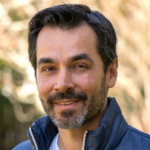EPISODE 206: “The Pro-Human Answer to Intolerance & Racism” with Bion Bartning
In this episode I’m joined by Bion Bartning, the founder of FAIR, the Foundation Against Intolerance and Racism. An entrepreneur and investor, Bion also co-founded eos Products, a personal care brand best known today for its iconic egg-shaped lip balm.
Bion launched FAIR to address head-on the tribalism, identity culture and politics of division that are pitting Americans one against the other.
With innocuous terms like diversity, equity and inclusion, or arcane ones like critical race theory, a cynical and intolerant orthodoxy of division is being advocated and enforced throughout America.
It’s infected virtually every American institution: colleges, businesses, government, the media, museums and the arts, the military and most alarmingly, our children’s K-12 schools.
In schools, “what’s called an “anti-racist” curriculum,” explains Bion, “is in every sense of the word, racist and is teaching children to see themselves fundamentally as defined by the color of their skin, by their immutable characteristics instead of seeing each other as unique individuals who are united by our shared humanity.”
What we must be doing instead is to share and teach what it means to be pro-human.
These so-called “anti-racist” ideologies have manipulated language in a way that makes it very difficult for normal people to oppose them. Suppose somebody comes in and says, “I’m bringing anti-racism to your institution,” and they tell you anti-racism means ending racism, who could be opposed?
“Our approach is to reclaim the words, reclaim the language,” explains Bion.
“We’re just insisting on what those words really mean to the vast majority of people. For example, the word equity means the quality of being fair and impartial.”
“And we’re not going to give up on the word diversity. Diversity is a good thing and just because somebody’s pushing conformity and calling it diversity doesn’t mean that we give up on the word diversity.”
In just a year and half, FAIR a mostly volunteer organization, has grown into a national grassroots network of 1,000s of people with chapters in over 40 states.
With its compelling aim to promote a common culture based on fairness, understanding, and our common humanity, FAIR’s big tent has attracted people from across the political spectrum with diverse backgrounds, ancestries, ideologies to advance civil rights and liberties for all Americans.
“I think what most people need is to feel that they’re part of a community,” explains Bion, pushing back against these toxic ideologies. “They need to feel that there are people backing them up, supporting them, who can help them with messaging and how to talk about how we are unique individuals with a shared common humanity. We call it being pro-human.”
pro-human
adjective ‘prō-’hyü-men
Advocating for one human race, individual civil rights and liberties, and compassionate opposition to racism and intolerance rooted in dignity and our common humanity.
The Foundation Against Intolerance and Racismis an idea whose time has come. Listen to Bion Bartning explain its work and then sign up to support the FAIR cause.
I know I will.
SUBSCRIBE TODAY
FEATURED GUESTS
Related
Episodes

Episode 277: “NATO Taunts Russia” with Stephen Bryen and Brandon Weichert
This episode examines the three explosive national security crises the United States and world are embroiled in today, any one of which could escalate into igniting a World War III.
Watch Now
Episode 276: Is Technology a Force for Good or Evil?
For the last 200 years, innovation and technology have produced dramatic increases in living standards and our quality of life.
Yet today there is a widespread and growing belief that technology has become the root of all evils with all sorts of claims being made that it destroys privacy, spreads misinformation, undermines trust, and democracy, eliminates jobs, discriminates by race, and gender, increases inequality, rips off the consumer, harms children, and even threatens the human race.
Watch Now
Episode 275: We won the Cold War and lost the peace : A Tour de Force with Erik Prince and Stephen Bryen
Ronald Reagan collapsed the Soviet Union, liberated the captive nations of Central Europe and restored “Europe Whole and Free.” But what happened after that haunts the Free World to this day.
Former Navy U.S. Seal and founder of the private military company Blackwater Erik Prince declares “We are fighting wars the wrong way.”
Stephen Bryen, known as the “Yoda” of the Arms Trade, is a former Deputy Undersecretary of Defense and founder of the Defense Technology Security Administration.
Watch Now
Episode 274: “Behind the Curtain: Unveiling the Arabella Network’s Vast Influence on U.S. Politics”
In this episode of The Bill Walton Show, Bill wades into the murky waters of the Left’s “dark money” manipulation of American politics with Scott Walter and Kristen Eastlick with the Capital Research Center.
Watch Now
Episode 273: Investing in a Polarized America: Federalism and Entrepreneurship with Jim Pinkerton
In this lively episode of the Bill Walton Show, Bill talks with Jim Pinkerton in a thought-provoking discussion about investing in the turbulent waters of today’s toxic political climate. With a focus on the stark Red-Blue divide in America, Jim offers a contrarian view that it’s fertile ground for what he terms “directional investing.”
Watch Now
